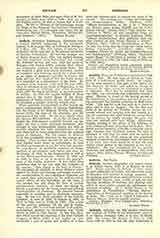

Andrada, ANTONIO DE, the pioneer missionary and explorer of Thibet in the seventeenth century, b. at Oleiros, Portugal, 1580; d. at Goa, March 19, 1634. He entered the Society of Jesus in 1596. From 1600 to 1624 he was the chief missionary in the Indies. In 1624, after almost incredible hardships he succeeded in penetrating into Thibet. Kindly received by the head sovereign of the country, Andrada returned to Agra for other workers like himself, and on his return to Thibet established a missionary center at Chaparangue. Recalled to Goa to act as superior of the Indies, he died there, poisoned for the Faith. Andrada has given in letters to his superiors and others a graphic and accurate account of his discoveries and labors. These have been published in Spanish and French and are incorporated in the works of P. J. Darde, S.J., “Histoire de ce qui s’est passe en Ethiopie” (Paris, 1628), and “Histoire de ce qui s’est passe au royaume du Thibet” (Paris, 1629).
JOSEPH M. WOODS

